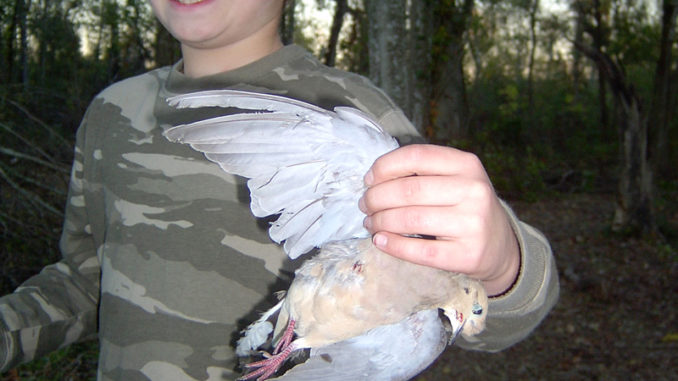
For the fourth straight year, South Carolina hunters may find a banded mourning dove in their bag this dove season.
The season opens on Sat., Sept. 2, and is broken into three segments: Sept. 2-Oct. 7, Nov. 18-25 and Dec. 21-Jan. 15. State wildlife biologists are encouraging hunters to be on the lookout for banded doves. South Carolina is one of 26 states across the nation participating in a three-year banding study that will generate valuable information on dove life history. The primary objectives of the study are to determine dove harvest rates, estimate annual survival, provide information on the geographical distribution of the harvest, and refine techniques for future dove-banding programs. Between July 1 and Aug. 15, wildlife biologists banded more than 2,300 doves at approximately 30 sites across the state.
“We banded doves from the mountains to the beach,” said Billy Dukes, small game project leader for the South Carolina Department of Natural Resources. “One of the objectives is to get a statewide representation of the dove population, and we feel we’ve done a good job of doing that.” Most doves don’t stray too far – more than 90 percent of the recovered doves have been recovered in state. But a few have stretched their wings. The king of these long-distance doves was a bird that was banded in northern Charleston County in 2003, and later killed in Moultrie, Ga. – a distance of 301 air miles. Other long-distance travelers included a bird banded in Union County that wound up in Northampton County, N.C., 278 miles away, and a bird that went from McCormick County to Columbia, Ky., a total of 276 miles.
“But the vast majority of our birds are raised and harvested in-state,” Dukes said. “There’s nothing really remarkable about their movement, but it is kind of interesting to see where some of them end up.” Hunters who harvest a banded dove should call 1-800-327-BAND to report the band number. Operators will be on duty 24 hours a day, Monday through Friday, during the hunting season. Banded birds may also be reported online at www.pwrc.usgs.gov by selecting “Bird Banding Lab.” Hunters can keep the bands, and will be provided a certificate identifying the age and sex of the bird, as well as the date and location the bird was banded.



Be the first to comment